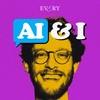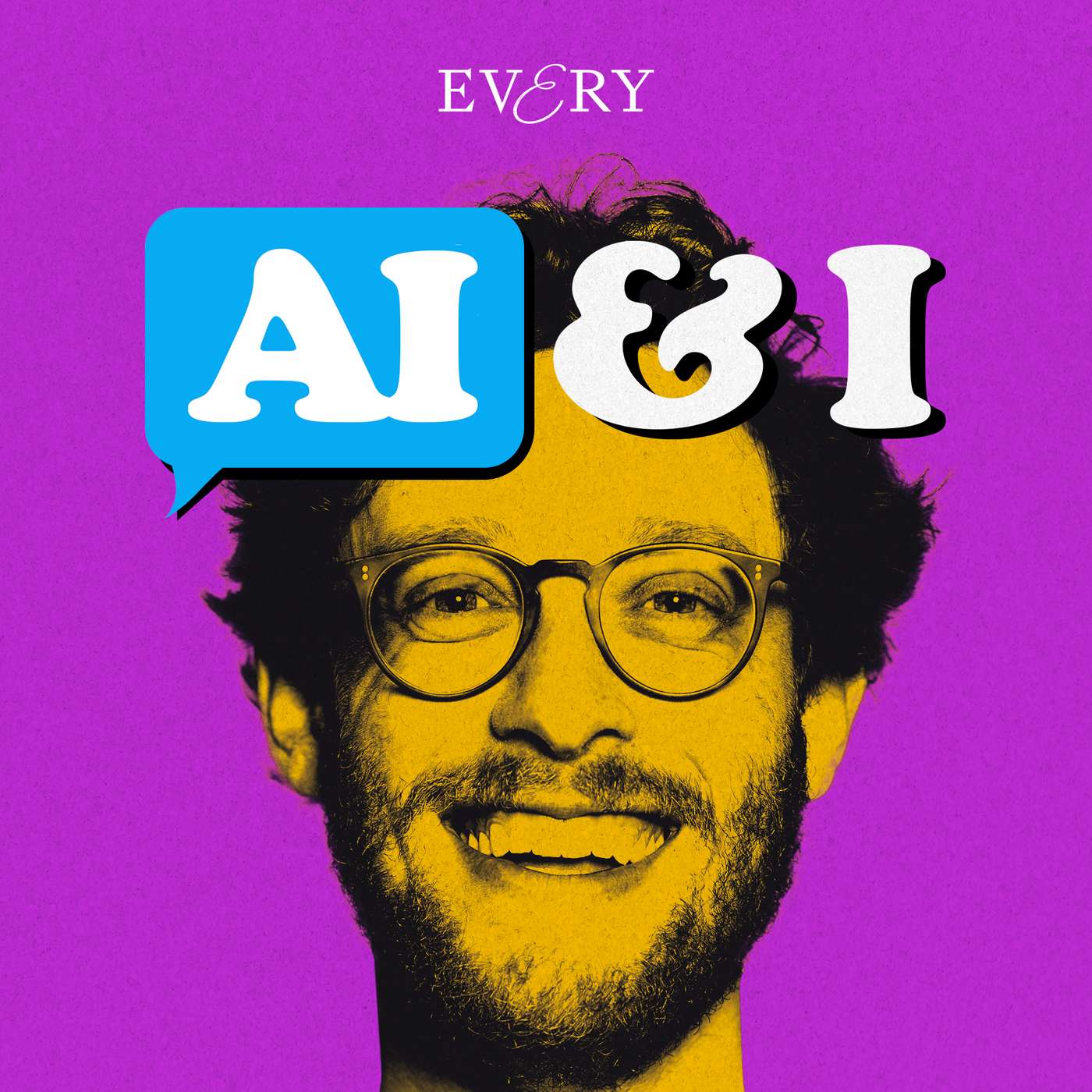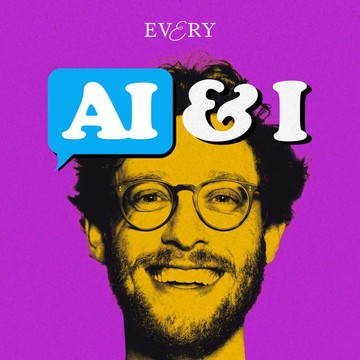

AI & I
Dan Shipper
Learn how the smartest people in the world are using AI to think, create, and relate. Each week I interview founders, filmmakers, writers, investors, and others about how they use AI tools like ChatGPT, Claude, and Midjourney in their work and in their lives. We screen-share through their historical chats and then experiment with AI live on the show. Join us to discover how AI is changing how we think about our world—and ourselves.
For more essays, interviews, and experiments at the forefront of AI: https://every.to/chain-of-thought?sort=newest.
For more essays, interviews, and experiments at the forefront of AI: https://every.to/chain-of-thought?sort=newest.
Episodes
Mentioned books

410 snips
Jan 14, 2026 • 55min
Why Your AI Learning Projects Keep Fizzling Out
Nir Zicherman, entrepreneur and CEO of Oboe, dives into the challenges of self-directed learning with AI. He highlights how traditional LLMs might not understand when learners are struggling or losing interest. Nir discusses the nuances between passive and active learning, arguing for the need for purpose-built platforms like Oboe that generate personalized courses. They also explore how different subjects require varying teaching methods and technologies, and the importance of keeping learners engaged without overwhelming them. Nir shares his own experience using Oboe to fill learning gaps.

272 snips
Jan 13, 2026 • 1h 33min
Vibe Check: Claude Cowork Is Claude Code for the Rest of Us
Felix Rieseberg, a product engineer at Anthropic, shares insights about Claude Cowork, a user-friendly AI tool designed for everyone. He explains the innovative design that separates 'Tasks' from 'Chats' and the async queue system that enhances productivity. The discussion covers practical demos like email drafting, calendar audits, and competitive analysis. Felix also highlights the importance of 'Skills' for customization, and the principles behind agent-native architecture, hinting at a future where knowledge workers can seamlessly interact with AI.

762 snips
Jan 7, 2026 • 60min
AI in 2026: Reid Hoffman’s Predictions on Agents, Work, and Creation
Reid Hoffman, co-founder of LinkedIn and an early investor in OpenAI, shares his bold predictions for AI by 2026. He discusses how agents will expand beyond coding into diverse areas, reshaping enterprise work. Hoffman warns of increasing negative sentiment around AI as it faces backlash for societal changes. He emphasizes the potential of AI in biotechnology, forecasting significant breakthroughs. The conversation also touches on the evolution of programming skills, stressing orchestration as a new frontier for developers.

485 snips
Dec 31, 2025 • 37min
Four Predictions for How AI Will Change Software in 2026
Brandon Gell, COO of Every, dives into fascinating predictions shaping software in 2026. He discusses the future of agent-native architectures, enabling AI to perform complex tasks seamlessly. Designers are poised to become powerful AI builders, leveraging creativity without technical barriers. The chat also highlights new engineering roles evolving from AI integration while exploring concerns like misinformation and the ethical implications of realistic AI-generated content. Gell emphasizes the need for tools that are accessible to all, paving the way for a more inclusive tech landscape.

235 snips
Dec 24, 2025 • 1h 1min
Best of the Pod: Reid Hoffman on How AI Is Answering Our Biggest Questions
Reid Hoffman, co-founder of LinkedIn and a philosophy enthusiast, delves into the intersection of AI and human nature. He posits that studying philosophy equips entrepreneurs with critical thinking skills essential for innovative solutions. Hoffman critiques traditional thought experiments, suggesting AI could reshape philosophical inquiry. He also discusses how technology reconfigures human cognition and promotes interdisciplinary approaches. Finally, he shares tips on leveraging AI, like ChatGPT, to enhance clarity and understanding in complex discussions.

175 snips
Dec 16, 2025 • 1h 16min
Attaining A Jhana Live: How Anyone Can Achieve Super Wellbeing
Stephen Zerfas, the founder of Jhourney, specializes in making jhana meditation more accessible. He reveals how his retreats enable participants to reach blissful jhana states within a week. During a live demonstration, he shares techniques like body scans and mantras. The conversation explores the playful approach to meditation, the importance of genuine practice, and how jhana can transform personal challenges. Stephen also discusses integrating AI to enhance meditation experiences, emphasizing the journey towards super well-being as a vital pursuit.

220 snips
Dec 10, 2025 • 1h 14min
She Turned Her Whole Life Into Training Data—For an AI Baby
Join Sarah Rose Siskind, a science communicator and comedy writer, as she explores her unique project, FetusGPT—an AI trained on her daily life experiences. She shares hilarious insights into the eclectic training data, from Seinfeld to snoring, providing a peek into AI's whimsical babbling. Siskind discusses how AI aids her comedy writing and emotional support during pregnancy, pointing out the curious parallels between child development and AI learning. Discover the innovative ways she uses AI for health insights and the importance of cautious validation in AI interactions.

1,548 snips
Dec 3, 2025 • 1h 25min
Why Opus 4.5 Just Became the Most Influential AI Model
In this discussion, Paul Ford, co-founder of Aboard and a celebrated tech writer, dives deep into the groundbreaking capabilities of Opus 4.5. He shares how this AI model enables autonomous coding and dramatically speeds up app development. Paul reflects on the emotional impact of such rapid technological change, urging careful consideration of its effects on roles and craftsmanship. The conversation also explores societal reactions, the importance of transparency, and the future of consulting as AI reshapes industries.

111 snips
Nov 26, 2025 • 1h 24min
Best of the Pod: Would You Shut Down Your Most Successful Product? The Arc to Dia Story
Josh Miller and Hursh Agrawal, co-founders of The Browser Company, recount their bold decision to halt Arc in favor of launching Dia, a next-gen browser infused with AI. They reveal the intense public backlash they faced and the essential reasons behind their pivot, emphasizing how AI demanded a fresh architectural approach. The duo shares insights into their prototype culture and the exciting user feedback on Dia's AI capabilities. They discuss the emotional struggles and team dynamics during this transition, highlighting the vision of a browser as a personal intelligence layer.

338 snips
Nov 19, 2025 • 53min
Best of the Pod: Claude Code - How Two Engineers Ship Like a Team of 15
Kieran Klaassen, general manager of Cora, and engineer Nityesh Agarwal dive into the power of AI in engineering workflows. They explore how AI agents can significantly enhance productivity, making a two-person team feel like a crowd of 15. Kieran shares insights on using Claude Code for everything from debugging to generating detailed GitHub issues. Nityesh contrasts various coding tools while emphasizing the importance of early issue detection. They also highlight the significance of combining human expertise with AI agents to streamline the development process.


